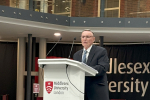The borough of Barnet is one of the most ethnically diverse in Britain. In yesterday's debate in Parliament on the disproportionate impact of Covid on people from black and minority ethnic communities, Theresa Villiers, MP for Chipping Barnet, highlighted the need for effective measures to tackle health inequalities and combat discrimination and racism. In her speech, the MP for Chipping Barnet said:
"It has been deeply disturbing to watch and witness the impact of Covid-19 on people from black, Asian and minority ethnic communities. It has been equally moving to hear the speeches so passionately made this afternoon.
It has been truly heartbreaking to see the photos of the health and care workers who have lost their lives, so many of them from BAME backgrounds. Like others, I want to take this opportunity today to pay tribute to all BAME workers on the frontline in the NHS, in social care, in transport, in council services, in retail and in the police, especially those in my Chipping Barnet constituency. For their sake, and to ensure that we do all we can to protect BAME communities from harm, it is vital that we have intensive research into why Covid has had this disproportionate impact.
We also need to get much better at delivering public health messages effectively in a way that works for all communities. As a civilised society, we can no longer tolerate the health inequalities that the Covid epidemic has exposed and intensified. The NHS long-term plan has a strong focus on the prevention of ill health. That needs to be turned into results which see people of all backgrounds and ethnicity living longer and healthier lives.
I believe this country has come a long way in recent decades towards tackling discrimination, combating racism and building a more cohesive society that is proud of its ethnic and cultural diversity. I feel that particularly strongly about my constituency and the borough of Barnet, which is one of the most diverse in Britain, but the Covid emergency and the cry of pain that has arisen after the appalling killing of George Floyd are wake-up calls—both of them. They are a stark reminder that while we have come a long way, there is still a long road to travel before we can say that everyone in this nation is being given the chance to go as far as their talent and their hard work will take them, whatever their faith, ethnicity or cultural background.
As everyone has pointed out, we have had a long list of reports on this. Now is the time to press on with measures that tackle the problems that those reports have identified and which are holding people of colour back from realising their potential. That includes tackling not just health inequalities but educational under-achievement and the worrying prevalence of young black men in the criminal justice system, and of course it must include doing more to combat racism and prejudice, both conscious and unconscious, structural and individual.
I want to conclude by quoting from a British Tamil intensive care nurse. British Tamils are one of many minority communities represented in my constituency, and I have always been hugely impressed by the immense contribution they make to our national health service. Nurse Thibyaa Mahasivam told the Tamil Guardian:
“Not one of us hesitated to step forward… Yes many of us complained, we had every right to—this was how we were able to unload our stress and worries. But when given the choice to relocate elsewhere the vast majority of us chose to put our lives on the line.”
We owe our BAME doctors, nurses and frontline workers so much. We now need to ensure that gratitude delivers lasting social change that backs aspiration, hope and fairness and gives everyone in this great country, with all its diverse communities, a fair chance to get on and make a success of their lives."


